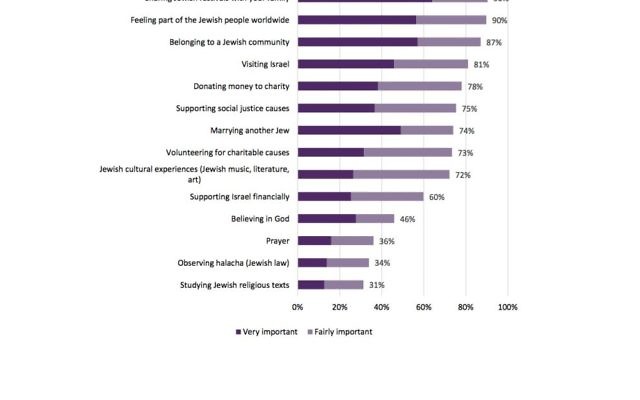Gen17: Aus Jewry, the big questions
It is Passover, so it is traditional for Jews to ask questions and fortunately, for the Australian community, we've already done a lot of that for you as part of Gen17.
IT is Passover, so it is traditional for Jews to ask questions and fortunately, for the Australian community, we’ve already done a lot of that for you as part of Gen17.
This national survey is best summed up by one succinct question: What defines Australian Jews?
Although we didn’t ask this exact question, it represents what is arguably the crux of the survey.
But what, I hear you ask, is Gen17? More than two years in the making, Gen17 was a survey of the Jewish population of Australia.
Carried out last year, it elicited 8621 responses, making it the largest Jewish communal survey of its kind, not just here but possibly in the world.
Gen17 or the “Australian Jewish Community Survey” was a collaborative effort between JCA in Sydney and the Australian Centre for Jewish Civilisation at Monash University in Melbourne.
It provides us with a once-in-a-decade opportunity to explore the diversity of Australian Jewish identity and Jewish life to the full.
You might then ask, isn’t the census good enough? The census is indeed a wonderful resource that the Jewish community is fortunate to benefit from.
But its interest in Jews is strictly limited. Once you have told it you are “Jewish” there is little more to say. It doesn’t ask what kind of Jew you are, nor how religious you are, or how often you go to the synagogue or whether you eat kosher meat.
It isn’t interested in whether you have experienced anti-Semitism or are descended from Holocaust survivors. And it certainly couldn’t care less whether you have been to Israel or what your views on that country are.
But Gen17 does ask these questions, and many more.
And just as census data are used by government departments to plan our economy and state affairs, Gen17 data will be used by the Jewish community to plan service provision and community affairs.
The survey wasn’t carried out because we are nosey or mischievous but because understanding the answers to these questions is a vital part of communal planning and there is no other way to get hold of them.
After all, is it not, at the very least, prudent to check in with empirical reality before spending scarce communal dollars on the basis of instinct and anecdote?
Without informed decision making, the efficient running of Jewish communal services – whether that’s care, education, outreach, security, or culture – is extremely challenging.
OK, so what other questions did you ask? A great many, as it happens. On average, respondents spent 45 minutes answering them, a remarkable statistic in itself.
We asked if you have kids and whether you send them to Jewish schools. Whether you donate to Jewish charities and, if so, how much?
Whether your partner is Jewish and how you are raising your children, should you have them. How much Jewish education have you experienced? Did you ever attend a Jewish youth movement? You get the idea.
So what have we learnt? Well, all of this stuff helps us answer that initial question, What defines Australian Jews.
So far we have only examined the national headline data, barely scratching the surface of what’s potentially available.
But this already reveals an Australian Jewish community that is gradually secularising, shifting away from traditional/Orthodox positions towards more progressive and secular streams. Nevertheless, Australian Jewish identity is keenly felt and widely practised.
For example, almost all of us (eight in 10) are attending a Passover seder this week. Passover is by the far the most commonly observed Jewish practice of them all, both here and internationally.
That is probably because it appeals to one of our most basic human desires: matzah ball soup. Oh, and its unifying message of freedom may also have something to do with it.
But some Jewish practices are rather less commonly observed than Passover. For example, far fewer of us (less than three in 10) buy kosher meat for the home. And although slightly more (four in 10) are likely to attend synagogue this Shabbat, these are hardly “typical” Australian Jewish traits. Neither is “Believing in God”.
Overall, just under half of us regard this as being important to Jewish identity, but it matters far more to some (eight out of 10 Modern Orthodox) than to others (barely one out of 10 secular).
To appreciate what truly unites us as Jews we need to look again at those markers of Jewishness that appeal to our basic human instincts.
It is no coincidence that we almost all (over nine out of 10) consider remembering the Holocaust, upholding strong moral and ethical behaviour, and combating anti-Semitism to be important aspects of our Jewish identity.
That is because they reflect the common human desire for justice and fairness.
So while you celebrate freedom this Passover, freely ask the question, What defines Australian Jews?
And if you are still struggling for an answer, go and check out the results of Gen17.
DAVID GRAHAM, the JCA demographer, co-authored the report with ANDREW MARKUS of the Australian Centre for Jewish Civilisation, Monash University.


comments